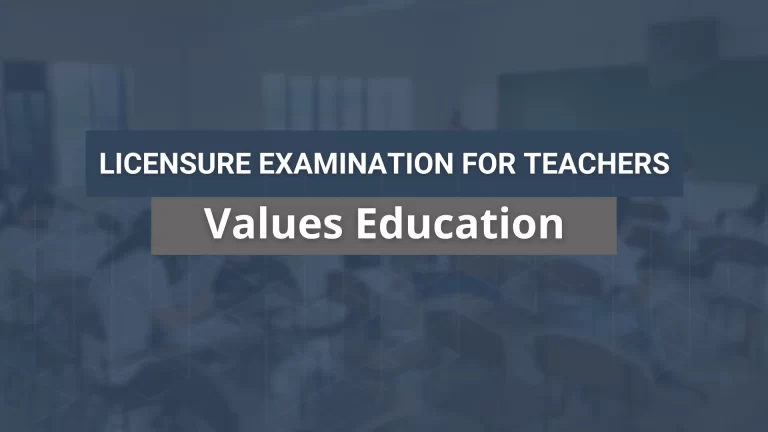This is the Multiples Choice Questions Part 1 of Values Education. In preparation for the LET Exam, practice, and familiarize every question we have, it might be included in the actual examination. Good luck.
Be fully prepared for your exam, follow our tips on effective studying and test-taking strategies. Click here to read the tips:
| Board exam for professionals is important and absolute in 5 powerful reasons |
| Top 5 risky behaviors to avoid during board exam reviews |
| Top 5 big mistakes when learning during board exam reviews |
| More… |
Values Education Part 1
1. The Filipinos have constituted themselves into a nation – state to pursue the goal of social progress and total human liberation and development of their:
a. Intellectual dimension
b. Political dimension
c. Moral dimension
d. Social dimension
Answer: c
2. The process of working out a sense of morality through the active structuring of one’s own social experiences, the outcome of which is a preference that is considered desirable that is considered desirable or acceptable by a referent group:
a. Values analysis
b. Values modification
c. Moral development
d. Values clarification
Answer: c
3. Children in his level or moral development conceive the “right” or the “moral” as the literal or strict obedience to rules, that they should submit to these rules, that they should submit to these rules as an obligation to power and authority to avoid punishment by elders:
a. The pre-conventional stage
b. The heteronymous stage
c. The pre-moral stage
d. The autonomous stage
Answer: d
4. Value-laden ideas as that tells about the learners’ behavior such as his attitude, interest, aspirations, worries and beliefs:
a. Value indicators
b. Valuing
c. Creative goodwill
d. Behavior indicators
Answer: b
5. In layman’s language, the term VALUE means one of the following:
a. To realize a certain urgent demand for something important
b. For one or something is worth or what one prize in life
c. To have power or vigor to do a specific thing
d. Basic attitude and core beliefs
Answer: b
6. Empowering the person’s will to do good is exercising in him called:
a. Full of truth
b. Rationalization
c. Love and fairness
d. Freedom and responsibility
Answer: a
7. The deepest source of man’s most authentic actions, the most privileged place in which God speaks to him, and the highest peak of the person’s humanity called:
a. Practical judgement
b. Spiritually
c. Truth and goodness
d. Conscious or central sense
Answer: c
8. The valuing process as a teaching strategy focuses on aspect of one’s own life in general, understands without judging, pursues reflection and:
a. Focuses on a major approach
b. Includes illustrating the strategy
c. End with the limitation of the approach
d. Develops thoughtful self-direction
Answer: d
9. Developing more complex moral reasoning patterns through successive and sequential stages among learners may be best stimulated through the:
a. Moral development approach
b. Cognitive development approach
c. Development approach
d. Moral dilemma strategy
Answer: d
10. The most flexible and effective strategy in encouraging a person to introspect about his thoughts and ideas, consider other alternatives, and arrives at a purposeful stance for himself and in relation to other called:
a. Discussion
b. Moral dilemma
c. Total person experimental learning
d. Clarifying response
Answer: b
11. The wisdom or God or the divine reason and will, which directs all the actions and movement of thing:
a. Ethical or moral norm
b. Universal moral law
c. Eternal law
d. Natural law
Answer: a
12. values vary in different generation, cultures, and societies and within persons themselves. This means that:
a. Values are dynamic
b. Values are transmitted
c. Values are learned
d. Values are caught from various source
Answer: d
13. To help the Filipino develop his human potential, contribute to the growth of the Philippine culture and built. appropriate structures and institutions is the task of:
a. Education
b. Society and nation
c. The Philippine Constitution
d. Political leaders
Answer: b
14. In the experiential learning process, which of the following phases encourages students to share their feelings and thoughts with one another?
a. Application phase
b. Value processing phase
c. Directive phase
d. Introspective phase
Answer: b
15. The teacher becomes a director of value learning and enriches the learning through cognitive and effective inputs:
a. Abstraction
b. Activity
c. Analysis
d. Application
Answer: c
16. One of the reasons mass media play a vital and important role in our society is the called:
a. They have a great role in the formation of Filipino values
b. They cater to the uplifted of the common good
c. They correct the miseducation of the Filipino’s
d. Filipino today are products of media
Answer: d
17. The Filipino’s lack of nationalism and dependence on foreign power is a result of:
a. Of the school fixed curricula
b. Some religions are becoming a money making business
c. Of the disintegration of families as a basic unit of society
d. Of the domination of media and new communication technologies
Answer: b
18. Which of the following statement if the most effective means of acquiring moral values?
a. By reading literature on moral development
b. By following the advices given by the significant others
c. By listening to significant others for their moral values
d. By examining what she/he caught and by reflecting on what she/he learned
Answer: a
19. What is the basic premise in the development of the human being?
a. The development of human being is limitless
b. There in a supreme being more powerful than oneself
c. The human being’s potential are means to development
d. The human being’s endowed with faculties for optimum development
Answer: b
20. When we compare test scores of college students with their cumulative grade point at the time of testing, what kind of validity are we establishing?
a. Criterion related
b. Predictive
c. Concurrent
d. Content
Answer: a


